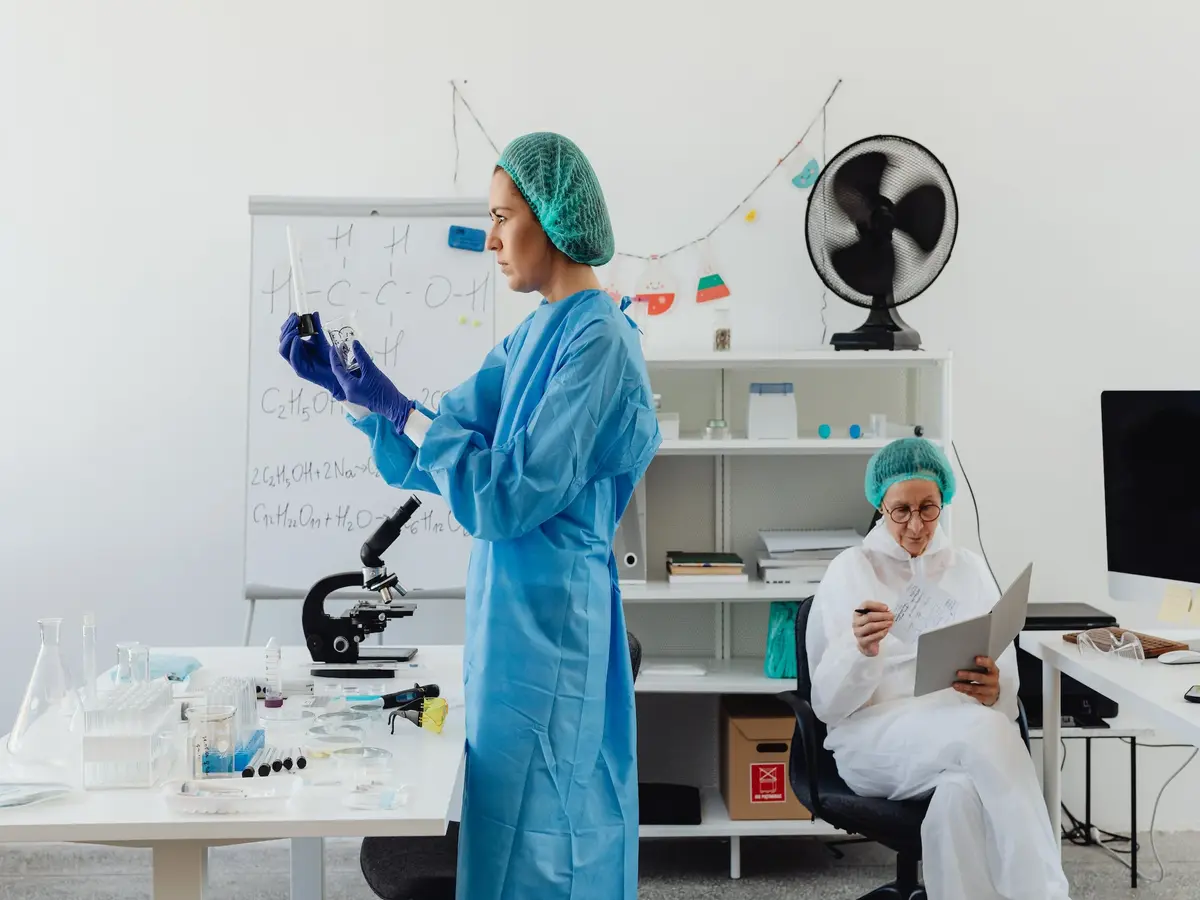Here are the key differences between biochemistry vs biomedical engineering. Learn how they are important in molecular processes.
Biochemistry vs Biomedical engineering
| Aspects | Biochemistry | Biomedical engineering |
| Definition | Study of chemical processes in living organisms. | A branch which integrates principles from engineering and biological sciences to develop technologies. |
| Primary focus | Biological sciences. | Engineering. |
| Key Areas of Study | -Enzymes and proteins. | -Medical imaging and signal processing. |
| -Metabolism and biochemical pathways. | -Biomaterials and tissue engineering. | |
| -Genetics and molecular biology. | -Medical devices and instrumentation. | |
| Applications | -Drug discovery and development. | -Medical imaging devices (MRI, CT, etc.) |
| -Molecular biology and genetics research. | -Prosthetics and orthopedic devices. | |
| -Clinical diagnostics. | -Biomedical sensors and monitoring devices. | |
| Career Paths | -Research Scientist | -Biomedical Engineer. |
| -Clinical Laboratory Scientist | -Biomedical Device Developer. | |
| -Pharmaceutical Industry | -Healthcare Technology Consultant. | |
| Degrees | -Bachelor’s, master’s or Ph.D. in Biochemistry | -Bachelor’s, master’s or Ph.D. in Biomedical Engineering. |
| Involves chemistry, biology, and bioinformatics. | Combines principles from engineering, biology, and medicine. | |
| Research Areas | -Cellular processes | -Medical imaging technology development. |
| -Protein structure and function | -Biomaterials for implants and prosthetics. | |
| -DNA and RNA studies | -Rehabilitation engineering. |
What are the differences between biochemistry and biomedical engineering?
Biochemistry
Focus
Biochemistry is the study of chemical processes and substances within living organisms.
Primary focus
It falls under the domain of biological sciences. It emphasizes the understanding of cellular and molecular aspects of life. Researchers in biochemistry investigate the structure, function and interactions of biological molecules, including proteins, nucleic acids, lipids and carbohydrates.
Key areas of study
Enzymes and proteins: Investigating the catalytic properties and functions of proteins.
Metabolism: Understanding the chemical processes that occur within cells to generate energy.
Genetics and molecular biology: It explores the molecular basis of genetic information and its expression.
Applications
Drug discovery and development: To the identification and design of pharmaceuticals.
Clinical diagnostics: Developing and improving methods for detecting and diagnosing diseases.
Molecular biology research: Advancing our understanding of genetic and cellular processes.
Career paths
Research scientist: Conducting experiments and investigations in academic or industrial settings.
Clinical laboratory scientist: Performing tests and analyses in clinical laboratories.
Pharmaceutical industry: In drug development and quality control processes.
Degrees
Biochemistry programs are offered at various academic levels, including Bachelor’s, Master’s and Ph.D. degrees.
Research areas
Cellular processes: Studying the biochemical mechanisms occurring within cells.
Protein structure and function: Investigating the three-dimensional structures and roles of proteins.
DNA and RNA studies: Examining the molecular processes related to genetic information.
Biomedical Engineering
Focus
Biomedical engineering integrates principles from engineering, biology and medicine. It is studied to develop technologies and solutions for healthcare.
Primary focus
It falls under the category of engineering. It uses engineering principles to solve biological and medical problems.
Key areas of study
Medical imaging and signal processing: Developing technologies for visualizing and analyzing medical images.
Biomaterials and tissue engineering: Designing materials for medical implants and promoting tissue regeneration.
Medical devices and instrumentation: Creating instruments for diagnostics, monitoring, and treatment.
Applications
Medical imaging devices: Creates and improves technologies such as MRI and CT scanners.
Prosthetics and orthopedic devices: Used to design artificial limbs and devices for musculoskeletal support.
Biomedical sensors and monitoring devices: Biomedical engineering develops tool for real-time health monitoring.
Career paths
- Biomedical Engineer.
- Biomedical Device Developer.
- Healthcare Technology Consultant.
Degrees
Biomedical engineering programs are available at the Bachelor’s, Master’s, and Ph.D. levels. It also provides specialization in areas such as biomechanics, biomaterials and medical imaging.
Research areas
- Medical imaging technology development.
- Developing materials compatible with the human body.
- Enhancing technologies to assist individuals with physical disabilities.
Also read Is biochemistry hard? Biochemistry vs molecular biology.
Similarities of biochemistry and biomedical engineering
Based on biological sciences
Both fields are related to biological sciences. Both utilizes principles from biology and chemistry to understand and manipulate living organisms.
Medical relevance
Biochemistry and biomedical engineering are closely connected to medical research. They contribute to advancements in diagnostics, treatment and overall healthcare.
Technological applications
Biochemistry and biomedical engineering involve the development of technologies for various medical purposes, from diagnostic to drug development.
Healthcare improvement
The ultimate goal of both branch is to contribute to the improvement of healthcare outcomes. Both of them help to understand biological processes or the development of medical technologies.
FAQ’s
What is the major difference between the biochemistry vs biomedical engineering?
Biochemistry focuses on the study of chemical processes within and related to living organisms. But biomedical engineering integrates principles of engineering and biology to develop technologies for healthcare and medical applications.
What is Biomedical engineering?
Biomedical engineering is a branch of science where we use engineering to make better technologies for medical purposes.
Also read Differences between biochemistry vs organic chemistry.

